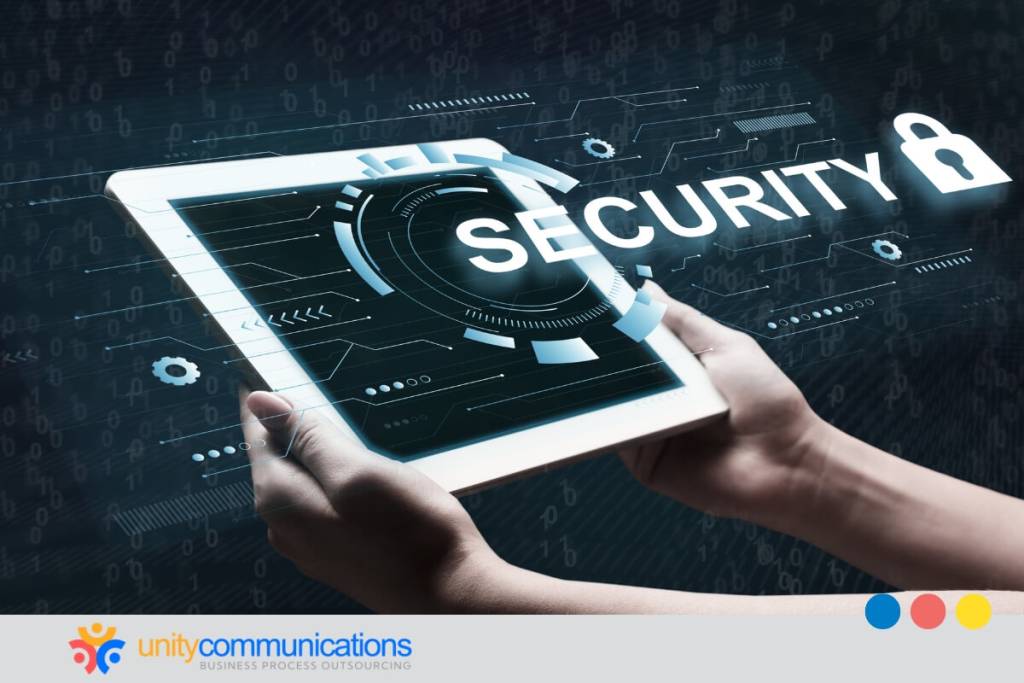IN THIS ARTICLE
Table of Contents
Many companies turn to specialized service providers to efficiently handle their cybersecurity needs. Contact centers specializing in business process outsourcing (BPO) are emerging as leaders in this industry, providing robust solutions to safeguard sensitive data and ensure regulatory compliance.
Global capability centers (GCCs) are trusted partners that combine technology, expertise, and 24/7 monitoring to safeguard organizations from cyber threats.
This article examines why GCCs in outsourcing cybersecurity are emerging as the trusted choice for enterprises seeking scalable, cost-effective defenses without overburdening their internal teams.
Why GCCs in outsourcing cybersecurity are foundational to operations

With the outsourced GCC market projected to reach nearly $79 billion by 2032, its role in managing critical business functions continues to expand rapidly.
Cybersecurity becomes a foundational element as these centers handle vast volumes of sensitive customer and operational data. It is essential for maintaining trust, preventing breaches, and ensuring compliance across global operations.
Here are reasons why cybersecurity is crucial in GCC operations:
- Protects sensitive customer data from breaches and unauthorized access
- Ensures compliance with global data protection regulations, such as the General Data Protection Regulation (GDPR) and the California Consumer Protection Act (CCPA)
- Maintains business continuity by preventing cyberattacks and operational disruptions
- Safeguards the company’s reputation by avoiding costly data leaks and cyber incidents
- Supports secure handling of financial transactions and personally identifiable information (PII)
- Enables secure remote work and cloud-based service delivery
- Mitigates risks associated with increasingly sophisticated cyber threats
- Builds client confidence through proven security protocols and certifications
Understanding what BPO is and its diverse functions further emphasizes the value of cybersecurity in GCC operations.
As these centers continue to manage critical business processes, investing in strong cybersecurity safeguards can protect their clients and operational integrity.
Centralized threat detection and response
With nearly 65% of businesses facing ransomware attacks in 2024, proactive threat management has become essential.
GCCs efficiently identify and mitigate such cyber risks before they escalate by centralizing security operations, streamlining incident response, and enabling real-time visibility across global functions.
GCCs in outsourcing cybersecurity help centralize threat detection and management through the following:
- Implement unified security information and event management (SIEM) systems to collect, aggregate, and analyze security data from multiple sources in real time.
- Establish a centralized security operations center (SOC) with experienced analysts who provide 24/7 monitoring, investigation, and incident handling across global operations.
- Use automated threat intelligence platforms to continuously scan digital environments, prioritize risks, and deliver actionable insights with minimal human intervention.
- Integrate real-time alerting and incident response workflows for swift containment, escalation, and resolution of security incidents.
- Leverage machine learning (ML) and artificial intelligence (AI) to detect subtle anomalies, recognize attack patterns, and predict cyber threats.
- Standardize protocols and communication channels across all contact center locations for consistency, speed, and clarity in threat response and recovery processes.
- Conduct regular threat-hunting exercises using advanced tools and behavioral analysis to detect hidden vulnerabilities and dormant threats.
- Collaborate with external cybersecurity partners, including vendors, researchers, and law enforcement, to gain broader threat intelligence and enhance incident response capabilities.
By centralizing threat detection and response, GCCs in outsourcing cybersecurity create a cohesive defense strategy that enhances speed, accuracy, resilience, and control across global operations.
Build a proactive cybersecurity culture in GCCs
Technology alone cannot stop cyber threats. GCCs also focus on embedding security awareness into everyday operations. A proactive culture empowers employees to be the first line of defense.
You can:
- Conduct regular cybersecurity training and awareness programs for all employees. They ensure ongoing understanding of emerging threats, attack methods, and defense strategies.
- Promote open communication about security threats. Encourage reporting suspicious activities through anonymous channels or designated points of contact. This approach builds a transparent and responsive environment.
- Implement clear policies and procedures. Emphasize individual accountability so employees understand their responsibilities in safeguarding data and systems.
- Recognize and reward proactive security behaviors and best practices. Highlight individuals or teams demonstrating exceptional awareness and initiative.
- Integrate cybersecurity goals into performance evaluations and team objectives. This strategy reinforces security as a shared business priority.
- Organize simulated phishing and social engineering exercises. Assess test readiness and identify areas requiring additional training or support.
- Get executive buy-in. Ensure leadership visibly supports and participates in cybersecurity initiatives. This sets the tone from the top and reinforces the importance of security culture.
- Provide accessible resources and tools. They help employees maintain secure practices daily. Examples include quick-reference guides, password managers, and incident response steps.
Fostering a proactive cybersecurity culture through GCCs empowers employees to act as the first line of defense against cyber threats. Your business can enhance security and resilience by fostering engaged teams and implementing consistent practices.
The compliance advantage: GCCs and data privacy
With over 160 jurisdictions enforcing critical privacy and data protection laws, the global regulatory landscape is more complex than ever. In this environment, protecting customer information and meeting compliance standards are top priorities for GCCs.
GCCs in outsourcing cybersecurity help businesses avoid legal and financial penalties, build trust, and gain a competitive edge. These include the following:
- Implement strict data access controls. Only authorized personnel can view or handle sensitive customer information.
- Use encryption and secure data storage. Protect data in transit and at rest while meeting global standards.
- Conduct regular audits and compliance assessments. Proactively identify risks and maintain regulatory alignment.
- Provide ongoing training for staff. Cover data privacy laws, security protocols, and ethical handling of personal information.
- Maintain documentation and audit trails. It expedites regulatory reporting and demonstrates compliance during inspections or investigations.
By prioritizing data privacy and regulatory compliance, GCCs in outsourcing cybersecurity help your company operate confidently and securely in a complex global landscape.
How GCCs strengthen incident response and recovery

Rapid and effective incident response is crucial to minimizing the impact of cybersecurity breaches on business operations. GCCs manage these incidents by coordinating swift actions and enhancing communication.
With their expertise and infrastructure, you can recover quickly while maintaining trust and regulatory compliance. Here are ways GCCs improve incident response and recovery:
- Provide 24/7 monitoring and immediate detection of security incidents.
- Coordinate cross-functional teams to execute response plans efficiently.
- Maintain comprehensive incident logs to support investigations and compliance.
- Utilize automated tools to identify and mitigate threats in real time.
- Facilitate transparent communication with stakeholders during times of crisis.
- Support business continuity by quickly restoring critical services.
- Conduct post-incident analysis to identify root causes and prevent recurrence.
- Deliver ongoing training to improve preparedness and resilience.
By leveraging GCCs for incident response and recovery, you can resolve problems quickly, minimize disruptions, and strengthen your long-term cybersecurity resilience.
Manage global cyber risks with GCCs
As cyber threats grow increasingly sophisticated and borderless, you need reliable partners to help navigate the complexities of global risk management. GCCs provide continuous monitoring, rapid response, and localized expertise across multiple regions.
GCCs in outsourcing enable you to address diverse risks while maintaining consistent cybersecurity standards worldwide. They:
- Monitor global threat landscapes in real time to identify emerging risks.
- Implement region-specific security protocols aligned with local regulations.
- Coordinate multi-location incident response to contain and resolve threats quickly.
- Utilize advanced data analytics to anticipate and mitigate potential cyberattacks.
- Foster collaboration between international teams for unified risk management.
- Provide regular security training tailored to cultural and regulatory differences.
- Leverage scalable cloud-based security solutions for global consistency.
- Maintain strong partnerships with cybersecurity vendors and law enforcement agencies.
With GCCs at the core of cyber risk management, your business can confidently face global threats while ensuring consistent protection and compliance across all regions.
Continuous monitoring: Build cyber resilience with GCCs
Maintaining strong defenses against cyber threats requires constant vigilance and real-time insights into network activities. GCCs enhance your ability to detect and respond to incidents promptly by monitoring issues around the clock. They build cyber resilience, minimize the impact of attacks, and foster operational continuity.
Here are ways GCCs provide continuous monitoring:
- Utilize advanced SIEMs to aggregate and analyze data in real time.
- Employ dedicated SOCs with expert analysts monitoring 24/7.
- Implement automated alerting systems to quickly identify suspicious activities.
- Conduct regular vulnerability assessments and threat-hunting exercises.
- Integrate ML algorithms to detect anomalies and emerging threats.
- Provide centralized dashboards for real-time visibility across all contact center operations.
- Coordinate with external cybersecurity teams to share comprehensive threat intelligence.
- Perform ongoing compliance checks to ensure adherence to security policies.
Through continuous monitoring, GCCs enable your company to stay ahead of cyber threats, fostering stronger resilience and uninterrupted operations.
Integrate cybersecurity into digital transformation
Securing new technologies becomes increasingly vital as you adopt digital transformation to enhance efficiency and improve the customer experience. GCCs play a crucial role in integrating cybersecurity measures across these digital initiatives to safeguard data and maintain trust.
Aligning security strategies with transformation efforts ensures smooth adoption while minimizing vulnerabilities. GCCs in outsourcing cybersecurity integrate security with digital transformation using the following:
- Incorporate security-by-design principles into new digital workflows and platforms.
- Use automated security tools to continuously monitor digital assets during and after deployment.
- Collaborate with IT and business teams to align cybersecurity goals with transformation objectives.
- Implement identity and access management (IAM) solutions to safeguard user credentials.
- Leverage AI-driven threat detection within digital channels, such as chatbots and customer relationship management (CRM) systems.
- Provide ongoing employee training focused on the secure use of new technologies.
- Conduct regular security audits and risk assessments throughout the transformation process.
- Develop incident response plans tailored to digital environments and emerging technologies.
By embedding cybersecurity into every stage of digital transformation, GCCs drive innovation while maintaining security and compliance.
Long-term cost savings through centralized security management

Centralizing security management helps streamline operations and eliminate redundancies, resulting in significant cost efficiencies over time. GCCs can optimize resource allocation and enhance threat detection by consolidating security functions under a unified framework.
They lower expenses and strengthen the overall cybersecurity posture for sustained protection. Setting up GCCs provides long-term cost savings in the following ways:
- Reduce the need for multiple disparate security tools by consolidating platforms.
- Lower staffing costs through centralized SOCs with shared resources.
- Improve incident response times to minimize costly breaches and downtime.
- Standardize security protocols to simplify compliance and audit processes.
- Leverage economies of scale when negotiating with cybersecurity vendors and service providers.
- Decrease training expenses by providing unified security education across all teams.
- Optimize infrastructure investments by using cloud computing or cloud-based centralized security solutions.
- Enable proactive risk management to prevent expensive remediation efforts.
By centralizing security management through GCCs in outsourcing cybersecurity, your company can cut long-term operating costs and build a more efficient, resilient, and scalable defense infrastructure.
The bottom line
Outsourcing cybersecurity to GCCs provides access to specialized expertise, advanced technologies, and round-the-clock monitoring that internal teams often struggle to match. GCCs offer scalable, cost-effective solutions that enable you to stay ahead of evolving cyber threats while ensuring regulatory compliance.
By partnering with GCCs, your business can enhance its security posture and focus more confidently on core business growth.
Ready to strengthen your cybersecurity strategy? Let’s connect to explore how GCCs can protect your data, support compliance, and free your teams to focus on core business growth.





